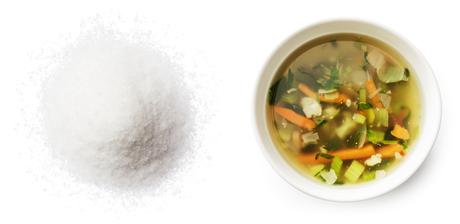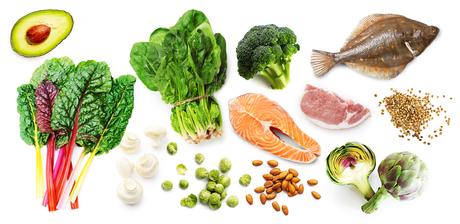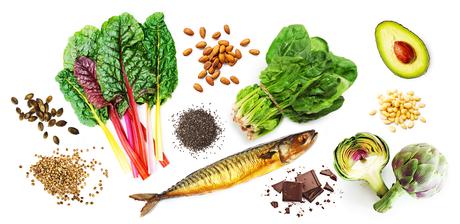It's becoming more and more widely accepted that keto diets can be healthy and also nutritionally complete. Meat, fish, eggs, dairy, nuts and vegetables are rich in key nutrients that your body needs on a daily basis. In some cases, however, supplementing with minerals known as electrolytes may be beneficial.
This is because when carb intake is extremely low, levels of electrolytes - especially sodium - can drop. And if this happens, you may not feel your best.
Symptoms of electrolyte deficiency and what to do about it
Interested in learning more about why electrolyte levels can decrease on low carb and other dietary options to replenish them? Keep reading!
Sodium
According to many health organizations, most of us should be cutting back on sodium in order to prevent high blood pressure and other health problems. For example, The American Heart Association recommends consuming less than 2.3 grams and ideally no more than 1.5 grams of sodium per day.
For people with hypertension who eat high-carb diets, this advice might be warranted. However, some of the supporting trial evidence shows a small blood pressure lowering effect without clear evidence of improved overall health. And many observational studies suggest that the optimal sodium intake is between 3 and 6 grams per day. In addition, on a keto diet, your sodium needs may actually increase, due to increased losses via the kidneys. Therefore, on a keto diet we are usually more concerned with too little sodium rather than too much.
Reasons for possible deficiency
When carb intake is dramatically reduced, blood insulin levels decrease, leading to a loss of salt in the urine. If sodium isn't replaced, you may experience a variety of symptoms.
Symptoms
Daily need: Most people on a low-carb diet will feel best with 3-7 grams of sodium (7-17 grams of salt, or about 1-3 teaspoons) per day.
However, if you have certain medical conditions - such as hypertension, kidney disease, or congestive heart failure - you may need to be more cautious about sodium. Read our complete guide on salt to learn why optimal intake varies from person to person.
Note that salt and sodium are not quite same thing, when you calculate your daily intake. Salt contains only 40% sodium, and the remainder is another mineral, chloride. So although you increase your sodium intake by eating more salt, it's important to remember that eating one teaspoon (6 grams) of salt provides you with only 2.4 grams of actual sodium.Add salt to your diet
Most people get at least 2 grams of sodium from the foods they eat. You can add a teaspoon of salt to a liter of water and drink it over the course of the day. Another strategy is to drink broth or bouillon, which contains about 1 gram of sodium per cup.

If you do physical exercise, adding sodium prior to a workout may improve your performance. Drs. Phinney and Volek recommend taking one-half teaspoon of salt within the half hour prior to exercising in their book The Art and Science of Low Carb Performance
Note: If you have high blood pressure, heart failure, or kidney disease, be sure to speak with your doctor before increasing your sodium intake.
Potassium
When sodium is lost during ketosis, the kidneys may respond by reabsorbing more sodium while excreting more potassium into the urine, in an attempt to maintain biochemical balance.
Symptoms of deficiency
- Muscle cramps
- Muscle twitching
- Heart palpitations/Increased awareness of heartbeat
Daily need: 3,000-4,700 mg (3-4.7 g) of potassium
Although most foods contain only low to moderate amounts of potassium, there are several low-carb sources that can help you meet your daily requirement.
High-potassium foods
To get more potassium into your diet, you could take potassium supplements. Or, why not try adding an avocado or a couple of servings of other keto-friendly high-potassium foods to your diet on a daily basis?

- Avocado 1,000 mg per medium avocado (200 grams)
- Swiss chard, cooked 950 mg per cup (175 grams)
- Spinach, cooked 840 mg per cup (180 grams)
- Mushrooms, cooked 550 mg per cup (150 grams)
- Brussels sprouts: 500 mg per cup (160 grams)
- Broccoli, cooked 460 mg per cup (160 grams)
- Salmon 430-500 mg per 4 ounces (114 grams)
- Meat 400-500 mg per 4 ounces (114 grams)
- Flounder 400 mg per 4 ounces (114 grams)
- Artichoke 345 mg per medium artichoke (121 grams)
- Hemp seeds 335 mg per ounce (30 grams)
- Almonds 200 mg per ounce (30 grams)
Supplements
If you're very active or don't consume enough potassium-rich food on a regular basis, it might make sense to take supplemental potassium on an as-needed basis.
Potassium supplements are typically available as 99 mg tablets. Note that although the front label on a potassium supplement may list 595 mg as the dosage, each tablet only contains 99 mg of pure potassium, which can be verified on the detailed "Supplement Facts" label on the back of the container.
Your blood potassium levels need to remain within a narrow range, and taking too much in concentrated form can be dangerous, especially if you take certain medications or have kidney disease. For this reason, it's best to get your potassium through food intake whenever possible.
Recommended supplements
If you do decide to take potassium supplements, here are some good options on Amazon:
NOW potassium supplements >Note: If you have high blood pressure, heart disease, kidney disease, or are taking medications for any other condition, be sure to speak with your doctor before you take a potassium supplement.
Magnesium
Although magnesium is found in a wide variety of foods, many people don't get enough from diet alone. In fact, it's estimated that almost 50 percent of the US population does not meet the daily dietary requirement for magnesium.
Deficiency symptoms
Symptoms of magnesium deficiency may include muscle twitching or cramping at night or after exercising. Although muscle cramps can also occur with inadequate potassium, sodium, or fluid intake, getting too little magnesium is a very common cause.
Daily need: 400 mg magnesium
High-magnesium foods
Most foods don't provide much magnesium, but there are a few good sources that can be included on a keto diet. What's more, many of them are high in potassium as well. Eating Swiss chard and other cooked greens on a regular basis is a great strategy for helping to meet your magnesium needs.

- Hemp seeds 195 mg per ounce (30 grams)
- Swiss chard, cooked 150 mg per cup (175 grams)
- Pumpkin seeds, dried 150 mg per ounce (30 grams)
- Mackerel 105 mg per 4 ounces (114 grams)
- Chia seeds 95 mg per ounce (30 grams)
- Dark chocolate (70-85% cacao) 70-90 mg per ounce (30 grams)
- Almonds 75 mg per ounce (30 grams)
- Spinach, cooked 75 mg per cup (180 grams)
- Pine nuts 70 mg per ounce (30 grams)
- Avocado 60 mg per medium avocado (200 grams)
- Artichoke 50 mg per medium artichoke (120 grams)
Supplements
Taking up to 400 mg of magnesium per day in supplement form is safe for most people with healthy kidneys. Some forms of magnesium can cause digestive issues, however, especially when taken alone. For this reason, it's best to take a magnesium supplement with a meal.
Forms that are well absorbed include magnesium citrate, magnesium chloride, and magnesium glycinate (also known as magnesium bisglycinate or diglycinate). Additionally, magnesium glycinate and Slow-Mag (a slow-digesting form of magnesium chloride) seem least likely to cause loose stools or other digestive issues.
Recommended supplements
If you decide to take magnesium supplements, here are some good options on Amazon:
NOW Magnesium citrate supplements >Note: If you have kidney disease, you may not be able to handle a large amount of magnesium. In addition, certain medications may interact negatively with magnesium supplements. Speak with your doctor before taking a magnesium supplement if any of these apply to you.
Slow-Mag (magnesium chloride) >
